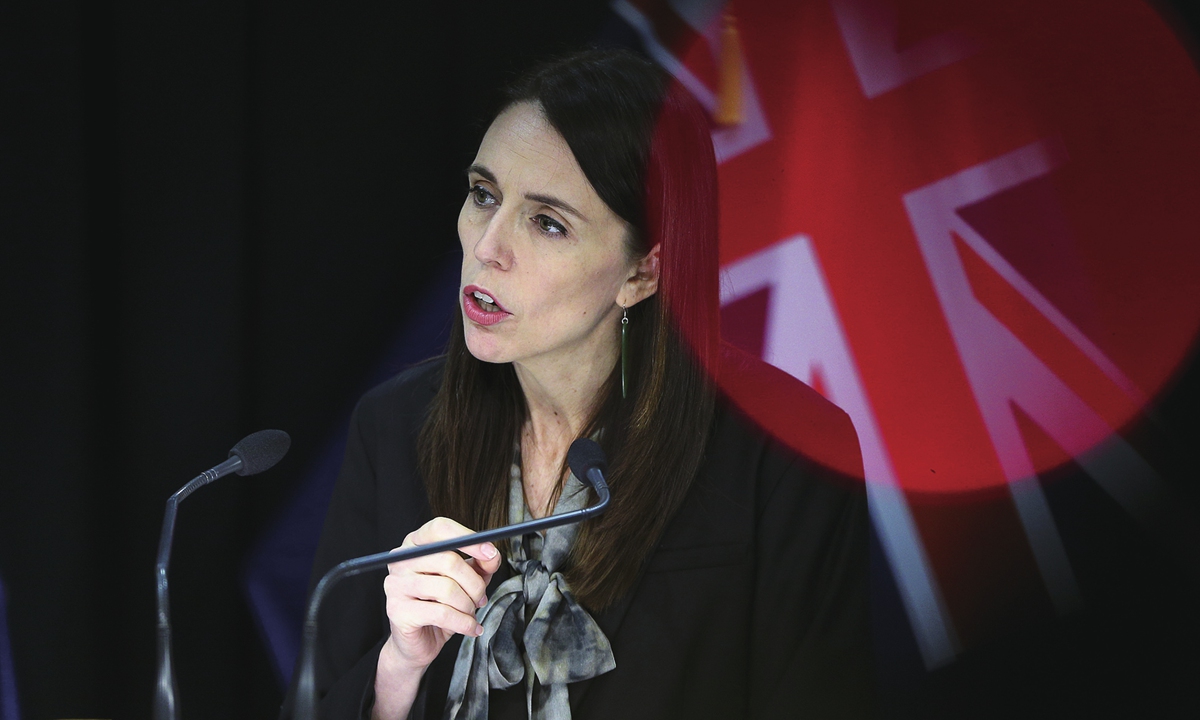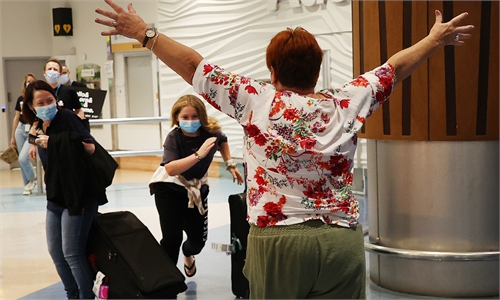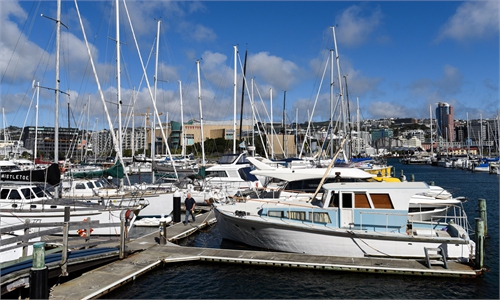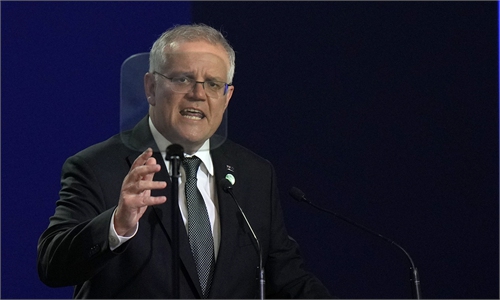New Zealand PM softens her stance on China during visit to Australia; Canberra's plan to rally Wellington against Beijing at the Pacific Islands Forum 'may be blown'

New Zealand Prime Minister Jacinda Ardern Photo: VCG
New Zealand's Prime Minister appeared to take a softer line on China's cooperation with Pacific island nations in the region in a speech during her visit to Australia on Thursday. According to Chinese analysts this signaled that Canberra's wishful thinking to rally Wellington against China at the upcoming Pacific Islands Forum (PIF) is very likely to have stalled.
The Prime Minister of New Zealand, Jacinda Ardern, said that it would be wrong to characterize China's engagement with Pacific islands as new or to force the island countries to pick sides, Xinhua News Agency reported. She made the remarks on Thursday while delivering a speech at the Sydney-based think tank, the Lowy Institute, during her visit to Australia to attend the Australia New Zealand Leaders' Meeting (ANZLM).
She highlighted engagement with Pacific island countries as an important principle for New Zealand's foreign policy, but noted that this does not mean other countries may not engage with this region, Xinhua reported.
"That is not to say there will not be others who have an interest in the Pacific, there are," she said, noting that France, Japan, Britain, the United States and China have all played a role in the Pacific for many years.
Ardern's remarks exposed that the illusion that "China is a newcomer in the South Pacific," hyped by the US-led West, is untenable, said Chen Hong, President of the Chinese Association of Australian Studies and Director of the Australian Studies Center at East China Normal University. China has been actively developing friendly and open cooperative relations with South Pacific countries for a long time and China can bring tangible benefits to countries in the region in terms of social and economic development, Chen told the Global Times on Thursday.
Under pressure from the US, the UK and Australia, New Zealand often had to say what the great powers wanted to hear, Yu Lei, chief research fellow at the Research Center for Pacific Island Countries of the Liaocheng University, East China's Shandong Province, told the Global Times on Thursday.
Ardern previously angered China during a visit last month to the US where she and Biden issued a joint statement on their concern about the China-Solomons security agreement.
The New Zealand leader cannot resist the growing pressure from the US and Australia as the US has been anxiously drawing its allies to its side to maintain hegemony, analysts said
But New Zealand is reluctant to completely lean to the US' side, analysts noted.
Yu explained that New Zealand's domestic market is small and needs the Chinese market. Also, the export products of the country are basically of the same quality as those from the US and Australia, and it does not want to shrink its export market. In addition, the tensions between China and Australia have brought great difficulties to Australia's domestic economy, which is also one of the important reasons for Morrison's failure in the recent reelection, Yu said. Therefore, New Zealand is more cautious on its China policy, he remarked.
With a comparatively independent China stance, New Zealand was seen less aggressive toward China in the Five Eyes alliance and has not been blatantly following the US' geopolitical strategies of containing China, like Australia does, according to analysts.
Ardern's visit to Australia came ahead of the PIF. According to Reuters, leaders of the PIF countries will gather in Fiji next week for an annual meeting at a time of "growing concern in some countries about China's influence," highlighted this year by a security pact with the Solomon Islands.
Addressing the Lowy Institute in Sydney, Ardern said she shares Australia's concerns about China's relationship with the Solomon Islands.
But she warned there needs to be a "country neutral" approach to relationships with the pacific island neighbors, Australian media outlet Skynews reported.
Ardern told the Lowy Institute that "even as China becomes more assertive in the pursuit of its interests, there are still shared interests on which we can and should cooperate."
While Australia is more willing to discuss with New Zealand on how to coordinate with the US to contain China, especially in the Pacific region, Wellington is more pragmatic, Yu said. The two sides is likely to reach some consensus, such as increasing aid to the island countries and urging China to abide by rules but nothing substantive will be achieved, Yu mentioned.
Chen also predicted that Australia will continue to hype the so-called "China threat" theory at the upcoming PIF to achieve its goal of excluding China from regional affairs.
The PIF is an international organization with the participation of Pacific countries which is an important mechanism for regional cooperation and problem solving, Chen remarked. The successful cooperation between some of the island nations with China in economic and security areas are unreasonably attacked and suppressed by the US-led West, Chen noted.
The forum may reach some consensus, such as on climate change, which is the biggest threat to island countries. Also, they could welcome other countries to strengthen mutually beneficial cooperation, Yu said, adding that the island countries do not hope to be used as pawns by big powers in the game.
Resolutions that are very unfavorable to China are not very likely to be released during the forum, as China's strengthening economic and trade cooperation with friendly island countries will help defuse provocations and pressure from the US and Australia, Yu believes.
Foreign ministers of the Pacific Islands Forum are due to meet in Fiji on Friday but the ministers from both Australia and New Zealand will not be able to attend, Reuters reported. Australian Foreign Minister Penny Wong will be at the G20 meeting in Indonesia while New Zealand's Nanaia Mahuta has COVID-19, their offices said, adding that other top officials would attend instead.
Chinese State Councilor and Foreign Minister Wang Yi will have meetings with foreign ministers from the US, France, Germany, Spain, Netherlands, Canada, Australia, Singapore and Saudi Arabia as the senior Chinese diplomat began his trip to the G20 foreign ministers' meeting, according to Zhao Lijian, spokesperson of the Chinese Foreign Ministry at Thursday's press briefing.




